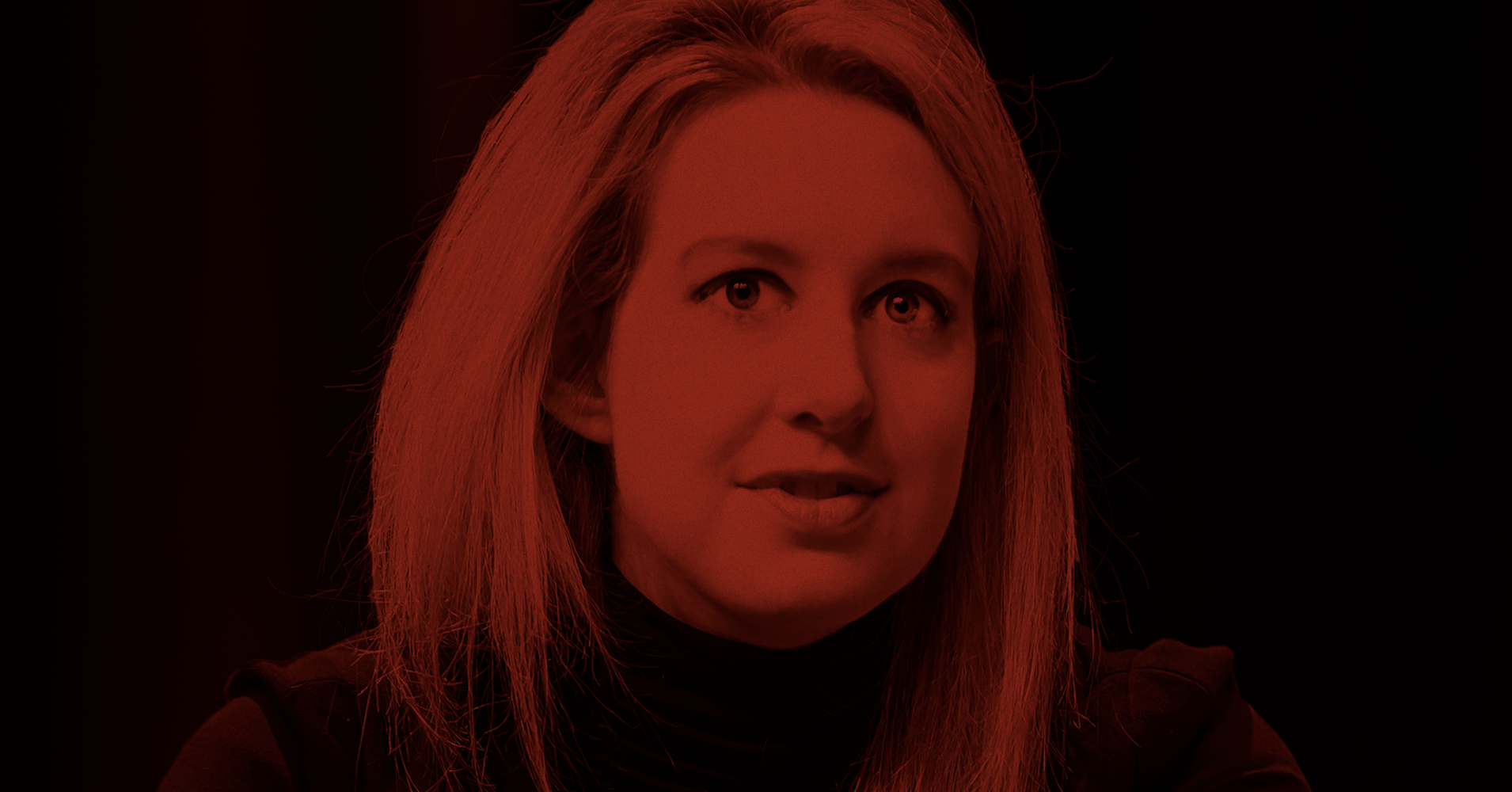[ad_1]

In 2014, Elizabeth Holmes was the subject of fawning articles touting the ways her innovative blood-testing technology company Theranos could change the world. She was the world’s youngest self-made woman billionaire, her picture printed on magazine covers, as she was hailed as the next Steve Jobs or Bill Gates. Today she’s more likely to draw comparisons to Fyre Festival’s Billy McFarland or faux heiress Anna Delvey.
Since Wall Street Journal reporter John Carreyrou wrote his first investigative piece on Theranos in 2015, exposing the company as a carefully constructed house of cards, people have been fascinated by the woman who dropped out of Stanford and founded the company at age 19. Holmes was the subject of Carreyrou’s best-selling book Bad Blood, ABC News’ podcast “The Dropout” and most recently, “The Inventor,” a documentary that premiered on HBO on March 18. (Jennifer Lawrence is reportedly set to star in a movie version of Bad Blood, directed by Adam McKay.)
Despite the glut of content about her, Holmes herself has been elusive since federal authorities charged her with fraud in March 2018 ― which only fuels a desire to know everything that’s out there about her. Is she a sociopath? Did she just have misguided delusions of grandeur that spun out of control? Is she the product of a culture that prizes marketing ― of products and of individuals ― over much else?
And, adding to the intrigue is the fact that she’s a woman. Holmes bore the markers of conventional beauty standards: thinness, blonde-ness, whiteness, youth. But she also deepened her voice and adopted the simple, gender-neutral black turtleneck uniform made famous by Steve Jobs. In this way, her femininity allowed her to stand out in a male-dominated space without being seen as a purely sexual object.
Where McFarland’s ability to defraud people is often attributed to his charisma and charm (though one might argue, after seeing the documentaries about him, that those qualities have been overstated), those who describe Holmes use language that implies she has a magic about her, which she used to seduce powerful men. The epilogue of Bad Blood describes Holmes as having cast a “spell” over her powerful, male investors and board members. ABC’s recent “20/20” episode about her repeatedly zooms in on photographs of her bright blue eyes, implying that she used them to draw men like former Secretary of State George Shultz, Stanford professor Channing Roberston and former Trump Cabinet member James Mattis into her orbit. A recent Forbes piece labels Holmes as a “sociopathic charmer who bewitched” these men.
To paint Holmes as a witch-like creature allows the culture to view her as the rare, inexplicable exception, rather than what she is: A privileged white lady who scammed her way to acclaim in a nation that is eager to lift up people like her.
We live in a world of constant scamminess, so often perpetrated by white people who are wealthy and attractive, and so seamlessly integrated into our culture that these repeated frauds hardly register. There are the Instagram models selling you colonic tea and nutritional supplements. There are the women you went to high school with who pop into your Facebook messages with “an exciting business opportunity.” There are the parents who scam their kids’ way into elite colleges, through both legal and criminal means.
The draw of Elizabeth Holmes and her millennial scammer contemporaries isn’t just that they perpetrated brazen frauds with startling levels of confidence. It’s not just that their whiteness and wealth and youth allowed them to signal credibility without actually having it. It’s that they are the living, breathing logical conclusions of the modern American Dream. A scam indeed.
If you, too, have found yourself equal parts repulsed and fascinated by the story of Holmes and Theranos, there are many resources at your disposal with which to satiate your obsession. Explore them below:
Overview With A Side Of Media Nerd
“The Inventor: Out for Blood in Silicon Valley,” directed by Alex Gibney for HBO
How to consume it: On HBO.
What you’ll get: While I maintain that this should have been a miniseries, not a one-off doc ― there’s just too much information to try and cram into two hours ― “The Inventor” is still worth watching. The HBO documentary paints a picture, not just of Holmes herself, but of the culture in Silicon Valley that she grew out of and that propped her up. The film falls short in its exploration of Holmes’ motivations, but draws some interesting parallels between Holmes and Thomas Edison, another inventor who over-promised before he could deliver. The other fantastic thing about “The Inventor” is that viewers get to hear audio from journalists Roger Parloff and Ken Auletta’s interviews with Holmes before she was exposed. Calling all media nerds.
Required Reading
Bad Blood: Secrets and Lies in a Silicon Valley Startup, by John Carreyrou
How to consume it: Buy the best-selling book at your local bookstore or online. You can also listen to the audiobook on Audible, which I have now done *several* times.
What you’ll get: If you really want to understand the story of Holmes and Theranos, Bad Blood is a must-read. No other journalist has studied her or her company more, and Carreyrou, who first broke the story of Theranos’ fraud in the Wall Street Journal in 2015, is a brilliant storyteller. The book reads like a thriller, and contains a breadth of information that you simply can’t fit into a limited-series podcast or two-hour film.
Psychological Insights
“The Dropout,” hosted by Rebecca Jarvis for ABC Radio and ABC News “Nightline”
How to consume it: Apple Podcasts, Spotify or wherever you get your podcasts.
What you’ll get: The first few episodes feel somewhat like a retread of information that Bad Blood explores in much greater detail. The real value of Jarvis’ podcast comes in the later episodes, which get into updates to the yearslong saga that occurred after Bad Blood was published. Listeners also get to hear from a former classmate of Holmes, and a former colleague who ran into her more recently. It’s these insights into Holmes’ psychology, both past and present, that are so captivating.
Holmes’ Personal History
“The Dropout,” on “20/20”
What you’ll get: A 90-minute dive into the story of Holmes and Theranos. If you’ve listened to the podcast, you’ll recognize some of the audio in this version of “The Dropout,” but it’s not just a recitation of the pod. Like “The Inventor,” this piece benefits from being on television, allowing viewers to both see and hear the people who worked at Theranos and existed in Holmes’ orbit. The episode also gets into Holmes’ upbringing and the mythology of her family history, which “The Inventor” largely sidestepped.
Confessions Of An Unwitting Aide
“How Theranos Misled Me,” by Roger Parloff
How to consume it: On Fortune’s website, here.
What you’ll get: An honest reflection of a journalist’s time with Holmes, and the role he played in legitimizing her. Parloff, who features heavily in “The Inventor,” has clearly thought very deeply about the time he spent with Holmes and the reporting he did on her and Theranos, which included the June 2014 Fortune cover story that launched her to mainstream fame. In December 2015, a few months after Carreyrou’s initial expose on Theranos, Parloff wrote a new piece: a mea culpa.
The Last Days Of Theranos
“Inside the Hive with Nick Bilton,” Feb. 19, 2019, and June 7, 2018, episodes
How to consume it: Apple Podcasts, Spotify or wherever you get your podcasts.
What you’ll get: The June episode is an in-depth conversation with Bad Blood author John Carreyrou. He’s always a great interview, so that’s certainly worth listening to, but where things get really interesting is the more recent episode, which takes listeners deep into the final months and days of Theranos.
The Scion’s Unraveling
How to consume it: Vanity Fair. Check out the original piece here. (And for a bonus follow-up about Holmes partying at Burning Man, head here.)
What you’ll get: Bilton pieces together what the atmosphere was like during the last days and weeks of Holmes’ time as CEO of Theranos. Despite facing massive fallout due to Carreyrou’s reporting and subsequent investigations, Holmes continued to operate as though her initial dream for Theranos was still salvageable, and as though she was still a high-rolling celebrity inventor. Bilton describes Holmes’ team of assistants, her newly acquired huskie Balto, who she began identifying as a wolf, and her unnervingly chipper attitude, even as everything seemed to be crumbling down. This is also the first piece that mentions Holmes’ recent engagement, to “a younger hospitality heir,” revealed to be William Evans ― a fact that has become fertile territory for amateur investigators on Reddit and Twitter.
[ad_2]
Source link

